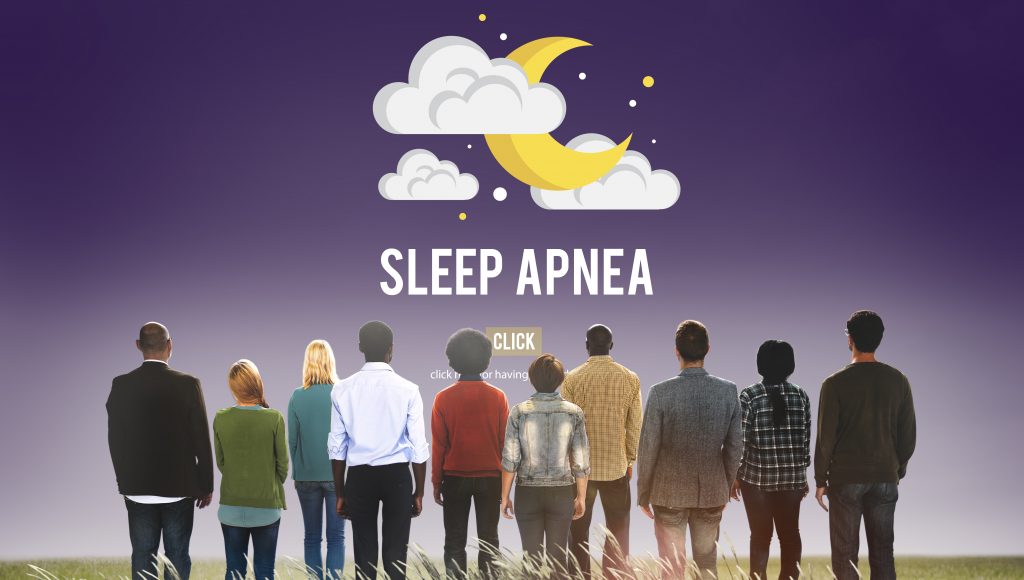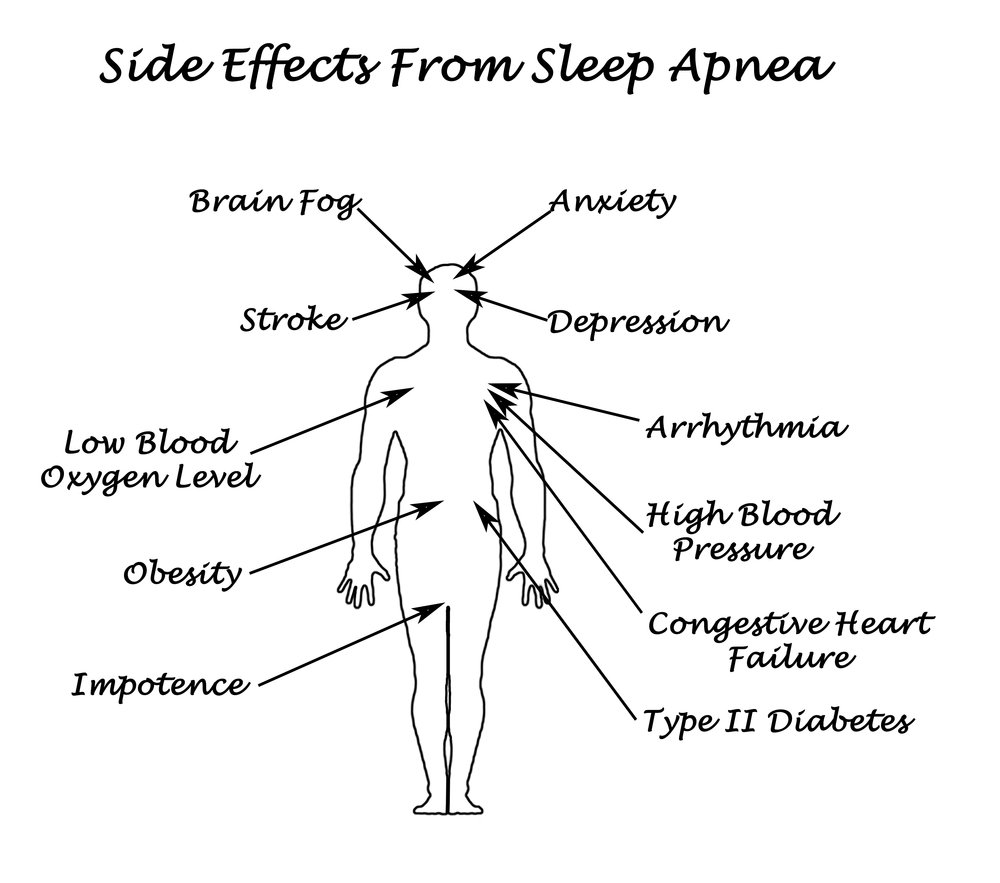
Sleep Apnea and Sleeping Disorders
According to the American Sleep Association, anywhere between 50-70 million American adults have some type of sleeping disorder. Whether it be problems snoring, falling asleep during the day, shortened sleep, or something like sleep apnea, sleeping disorders affect as many as 4 out of every 10 adults.
Obstructive sleep apnea is one such sleeping disorder that our Long Island dentists offer in-house treatments for. Because it’s so closely related to your oral anatomy, getting a better night’s rest is as simple as a phone call to one of our Suffolk County multi-specialty practices.
What are the Causes of Sleep Apnea?
For simplicity’s sake, we’ll focus on the type of sleeping disorders a dentist can help and is licensed to treat: obstructive sleep apnea, also called “OSA.”
OSA is caused by a blockage of the airway while you’re sleeping, preventing your body from getting the oxygen that it needs. You become oxygen deprived, leading to a host of clinical signals that your sleep partner or a sleep study may pick up on.
With OSA, the soft tissues at the back of your throat (including your tongue, soft palate, tonsils, and upper airway) seal against one another. When this happens, it prevents airflow from passing between your nose/mouth into your lungs. Sleep apnea may be exacerbated by things like alcohol use or certain medications.
Signs and Symptoms of a Sleeping Disorder
Here are some of the most common red flags to be on the lookout for:
- A large neck circumference
- Small or short jaw
- High blood pressure and cardiovascular disease
- Depression
- Weight gain
- Waking with a headache or sore jaw
- Frequent migraines
- Neck, shoulder, and back pain
- Flat, worn, chipped teeth
- TMJ disorder
- Fatigue and sleepiness throughout the day
- Snoring
- Difficulty managing other medical conditions, such as diabetes
Although some of these sleep apnea symptoms may feel like a normal way of life, they aren’t normal (or healthy.) If you’re experiencing as few as 2-3 of them, you could in fact have a life-threatening sleeping disorder.

Before starting any type of treatment, you’ll want to see a specialist or have a sleep study performed. Many people are surprised to learn that the option for home sleep studies is now available. You simply take the small machine home with you, record the needed data, and bring it back to your doctor to have it read. Making the proper diagnosis is the first step in successful apnea treatment.
Non-Surgical Sleep Apnea Treatments
CPAP machines have long been the go-to treatment for managing sleeping disorders. Unfortunately, these pieces of equipment are quite loud, cumbersome, and difficult to sleep with. As a result, sleep sufferers ultimately wind up sleeping in a separate bedroom and being unable to travel. Sadly, their family, professional, and social life suffers because of it.
Fortunately, there are more effective and less invasive answers out there. For example, an oral sleep appliance for apnea can help you improve your oxygen flow and eliminate your need for a CPAP machine. Sleep apnea mouthpieces use natural methods to physically open your airway, helping you breath when you’re sleeping.
While an oral sleep appliance can be used in conjunction with CPAP, the goal is to get the fit just right so that you can stop using your CPAP altogether. Most people will see at least some improvement in their sleep quality from the first night’s use.
Keeping a sleep journal and having our dentists adjust your oral appliance until articulating the perfect jaw positioning can help you experience higher quality sleep than you’ve had in years.
Oral sleep appliances are easy to care for, discreet, and can be packed for convenient travel out of town. Now you won’t have to change your personal or professional plans, just because you have a sleeping disorder.
Surgical Sleeping Disorder Treatment
What if an oral sleep appliance only helps a small amount or doesn’t work at all?
Depending on the type of sleep apnea you have (and its cause,) you could be a candidate for surgical treatment. Primarily, upper airway enlargement. This process uses something like a soft tissue laser to remove the excessive or fatty tissues at the back of your mouth, which are blocking your throat. It could include having your tonsils and uvula removed, and then reshaping your soft palate.
Are There Benefits/Risks to Consider?
As long as you’re working with your physician or sleep dentist, using something like an oral sleep appliance typically carries little to no risk. Some mild jaw pain is normal, especially when you first start wearing the appliance. A reprogrammer can help prevent any unwanted tooth movement due to the overnight pressure. If you’re in crucial health, do not go without your CPAP without first consulting with your physician.
However, having any type of surgery — even something as simple as dental treatment — always carries certain types of risks. It’s important that you always communicate underlying and existing health issues, including medications or supplements that you’re taking, so appropriate measures can be taken to ensure your safety.
Cost of Treatment for Sleep Apnea
Surprisingly, sleep apnea treatments such as oral appliances may be covered under your medical insurance. Other treatment costs to consider include your sleep study (home sleep studies are typically more affordable than ones performed in an overnight lab) and co-pays or deductibles.
Fortunately, oral sleep appliances tend to be much more affordable than CPAP machines. Their convenience and ease of use make them well worth the investment! We can provide you with an estimated cost at the time of your patient evaluation.
Am I a Candidate for Sleep Apnea Treatment?
Managing a sleeping disorder requires extensive training, experience, and networking between your various healthcare providers. At Sachem Dental Group, or multi-specialty practice can work with your physician or pulmonologist to determine if an oral sleep appliance is right for you.
Only certain types of sleep apnea can be treated with an oral appliance. The first step is proper diagnosis. We can work with your sleep physician or pulmonologist to help you get the treatment you need.
Schedule a Consultation with Our Sleep Dentists
Tired of wearing a CPAP? Think you or your sleep partner has a sleeping disorder? Contact Sachem Dental Group today to arrange a no-pressure consultation.
